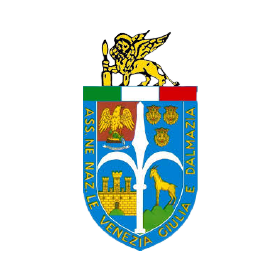Who we are
Created in 1947, the Venezia Giulia and Dalmatia Association is the most representative on a national level of the Italian people fled from Istria, Fiume/Rijeka and Dalmatia at the end of World War II; an ethnic cleansing by the Yugoslav army was in place together with the threat of the foibe. The consequence was the exodus of 350.000 people from all walks of life and the violent death of thousands innocent victims in the foibe.
After 60 years, the first and second generation of Istrian, Fiuman and Dalmatian refugees from all over Italy cooperate and work together to resurface that page of Italian history which was denied for long due to international politics.
It goes with it also the daily struggle to maintain the cultural and traditional values deprived from those lands; this battle is now supported by the Law 92/2004 which established the Giorno del Ricordo/National Memorial Day that every February, 10th brings the spotlights back to those sorrowful events but at the same time also to National identity values, which are fundamental for the Istrian, Fiuman and Dalmatian refugees. This attachment to those values makes the National Memorial Day a moment of reflection for the whole Nation, when words like “foibe” and “Istrian, Fiuman and Dalmatian exodus” are enlightened in their deepest tragic meaning but at the same time in a hopeful view to the future.
From this homepage you can reach the different information sections of the Venezia Giulia and Dalmatia National Association.
ANVGD history so far
Created in 1947, the Venezia Giulia and Dalmatia Association is the first national association focused on connecting and organizing the ten thousands Italian and native refugees coming from Venezia Giulia and Dalmatia; these territories with the Peace Treaty of February, 10th 1947 had been assigned to the former Yugoslavia or to the Zone B of the Free Territory of Trieste, never established. Its headquarter has always been left in Rome, because a close relationship with the Parliament, the Government and the central administrations has always been necessary.
The Association was reorganized with the constitutional act of June, 7th 1956 it has kept over the decades its spread to the whole national territory. This has been possible because the different Committees generated from the communities of Exiles who were at the beginning hosted in the refugee camps and later in the Julian-dalmatian “Villages” built in many Italian cities according to a special program of social housing.
Because it is a private Association it took on the task to keep, on a voluntary basis, unity among the refugees coming from the lost territories; this purpose is maintained through welfare and cultural activities of the local Committee, the celebration of civil and religious feasts, the participation and organization of study conferences, lectures..strictly collaborating with State Administration, local authorities, universities and schools, veterans associations and weapons and the cultural institutions.
The Association initiatives gave an important help to the legislative measures adopted by the Italian Parliament in order to solve the problems of the Julian-Dalmatian exodus, from social housing laws to those regarding the compensation for assets lost in the ceded territories (with this sum Italy paid the damages to ex-Yugoslavia in accordance with the Peace Treaty). For over 50 years the Assistance Office headed by Father Flaminio Rocchi OFM operated in this direction.The non-political and non-party nature of the Association was the essential prerequisite of its being highly regarded.
The Structure of Association
ANVGD is divided in 40 Provincial Committee and 14 Groups, spread in 16 regions (Sardegna, Campania, Abruzzo, Lazio, Toscana, Marche, Emilia Romagna, Liguria, Lombardia, Piemonte, Veneto, Trentino Alto Adige, Friuli Venezia Giulia, Umbria, Sicilia, Puglia), with more than 8000 members.
Hon. Lino Drabeni, former partisan commander in Northern Italy, escaped from Zara; Father Alfonso Orlini, Minister General of Friars Minor Conventual, escaped from Lussino;
Comm. Fulvio Bracco, businessman, born in Cherso;
Cmdr Libero Sauro, Istrian, son of the Gold Medal;
hon. Gianni Bartoli, Istrian, former Mayor of Trieste during the years of the Allied Military Government and when the city returned to Italy and hon. Paolo Barbi, born in a Dalmatian family, who was sub secretary several times, they all had the position of National President.
The President in Office is sen. Lucio Toth, magistrate, escaped from Zara.
After the dissolution of ex-Yugoslavia, the ANVGD has significantly increased its cultural activity, targeting as its goals:
-let the Italian public know about the events occured in the Eastern Italian boundary and the adjacent Balkan area, not only during the Twentieth century but also those of the previous centuries;
-make media and the public aware about the important political, economical and cultural role that South East Europe plays for Italy in this geopolitical adjustment moment and this convergence of the countries of the area to the European Union;
-awaken Italians’ sense of identity and national unity ;
– help the compatriots who are still resident in their homelands protecting their language and traditions. For this purpose the contacts with Unione Italiana are more frequent: it represents all the Italian communities still living in the territories belonging to the Republic of Slovenia, Croatia and Monte Negro.



